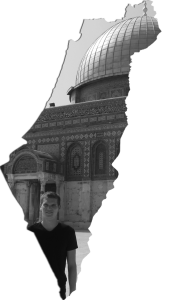 I didn’t enter JFK International Airport this January with malicious intent, but I felt like a criminal by the time I stepped on the plane to Tel Aviv. As many non-Jewish travellers to Israel have experienced with the Israeli airline El Al, the two hours before my flight was spent in interrogation. I like to think that the only people who know me better than the security agents are my parents, but I remember that my parents haven’t seen me naked in quite some time.
I didn’t enter JFK International Airport this January with malicious intent, but I felt like a criminal by the time I stepped on the plane to Tel Aviv. As many non-Jewish travellers to Israel have experienced with the Israeli airline El Al, the two hours before my flight was spent in interrogation. I like to think that the only people who know me better than the security agents are my parents, but I remember that my parents haven’t seen me naked in quite some time.
The next five months were filled with surprises, not all of them including nudity. In January, I left for Jerusalem thinking I was heading for a place with all the answers. After all, it’s the place of birth, life, death, and rebirth, right? Truth be told, the city has battled more with the human condition than it has with foreign invaders.
I quickly learned that I wouldn’t find many answers in Israel, only more questions. I began to think of it as a city confused with itself. For example, Israel is East, but it’s just as much West. It plays a significant part in the Bible, but most of the city is new. It’s predominantly Jewish, but no corner escapes the call to prayer. Children play soccer next to soldiers. That’s the real kicker. And that’s my only pun.
It all tricks you into adopting the idea that the city celebrates its magnificent diversity, then approached a 30-foot concrete wall with guard towers, barbed wire, and checkpoints. Suddenly, I was thrown into a twilight zone where these walls are called “fences,” where Palestinians are open targets of racial prejudice, and where the feeling of occupation lingers in the air like an odor that no one will claim.
Of course, this sadness is contradicted by scenes of intense joy. The vibrant colors, the smell of fresh breads and exotic spices, and sounds at the market were stimulating in ways our stores could never be. The sandy beaches of the warm Mediterranean and world-renowned nightclubs of Tel Aviv are just down the road. Although it took time to get used to the fact that no one has the right to a “personal bubble,” most of us came to enjoy the shared space in our everyday lives.
So I conceded. In the end, I returned with no mind-blowing religious revelation. I received no visions concerning the fate of humanity. Honestly, laying my hand on the Wailing Wall and praying where Jesus was crucified were all worth doing, but they didn’t bring me any closer to finding the answers to my questions. With Jews, Muslims, Protestants, Mormons, and Pagans all having dinner together at one table, and gazing at the stars while floating in the Sea of Galilee with new friends, did make me realize something: as humans, we spend so much time thinking about the afterlife that we forget about this one and the people who make it worth living.
I’ll always remember the things that I saw and the people I met in the Middle East this past spring. And I’ll never forget what I’ve learned: that we’re borrowing time for our lives, and we have no excuse not to live and love to the fullest.